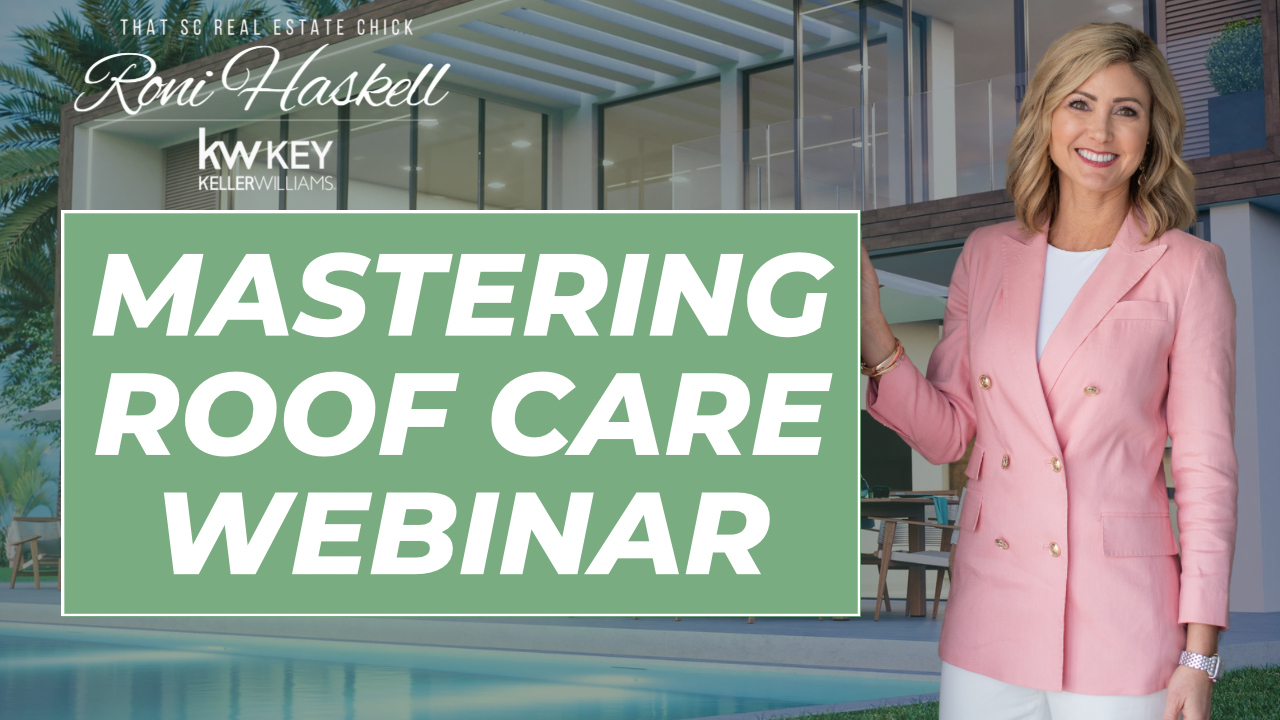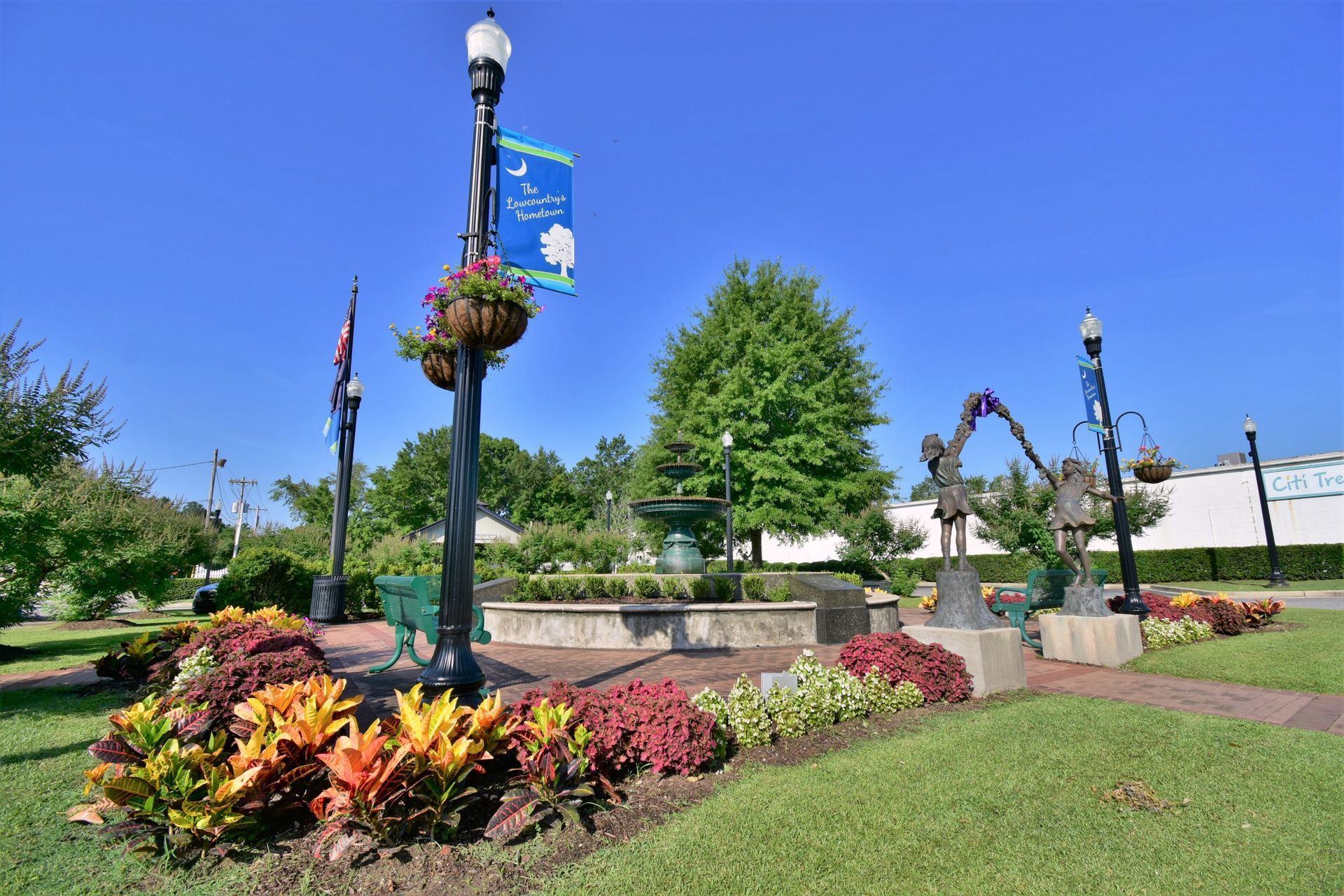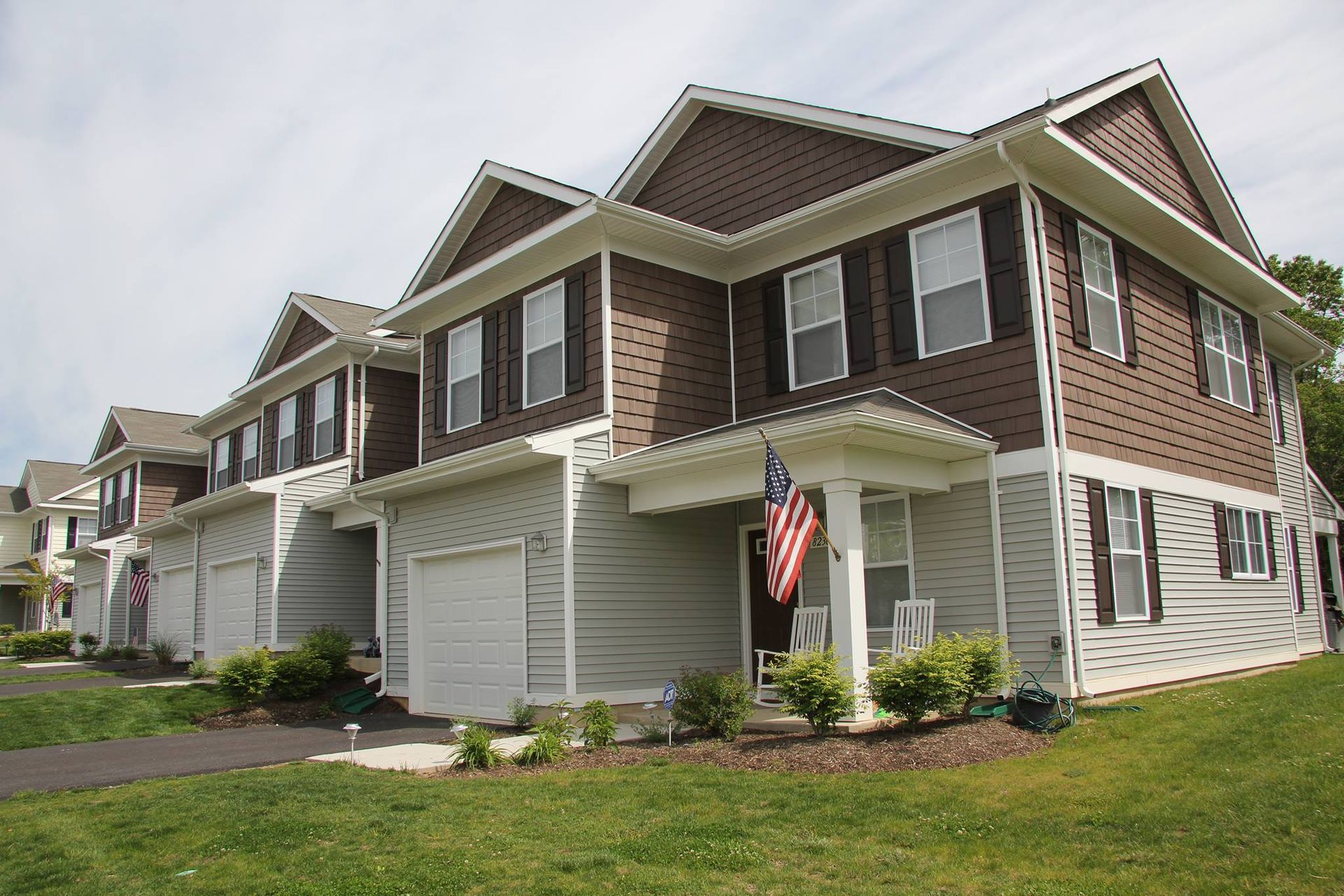Mastering Roof Care Webinar / SouthPaw Roofing

Roni Haskell:
I'm so excited that Robbie is here with Southpaw, and I'll give him a moment to introduce himself in just a minute. But my pool of professionals is what I call my people, and I can't do what I do at a high level every day and every week and every month, if it weren't for people that are contractors. I mean, I've got attorneys, CPAs, and home inspectors, just this whole collaboration. So you think of real estate as being your realtor, but I'm one piece of the puzzle. I can get you educated, I get you under contract, but once we start discovery, that inspection period and learning what needs to happen in the condition of the property, it's people like Robbie over at Southpaw that really is instrumental not only for me and advising me, but with my clients as well. So it's a win-win. He's quick to execute when I call, get his quotes, let us know the true picture of what we're faced with and what to expect.
So, without further ado, I'm going to go ahead and let you introduce yourself, Robbie, and get into the meat of the discussion about roofs.
Robbie Wachman:
Absolutely, absolutely. Thank you, Roni. You've been a great partner to us, you and your team. You guys are awesome to partner with, definitely roll out that red carpet and we appreciate that. But to start off, I mean, today, talking roofing is not always real exciting, so we'll try to make it as exciting as you can make roofing and then we'll finish up with a little Q&A at the end. I think more people get, they probably get more out of the Q&A than they do the beginning talks, so.
Roni Haskell:
They have a shoe-in to asking all of the challenging questions.
Robbie Wachman:
Absolutely.
Roni Haskell:
So you got a captive audience.
Robbie Wachman:
That's right, but to start off, I mean with Southpaw Roofing, it's a family-owned company and I think that makes us unique in a lot of ways. We don't roof like a lot of other roofing companies. Our business model is partnering with high, high level real estate professionals like yourself, Roni, and your team, and that's our business model. We want to take care of our realtors in the low country and we want to make sure that when you guys call us, we turn that over very, very quickly to make sure that you guys can take care of your customers the way you want to.
So with Southpaw Roofing, it started back about 40 years ago, a guy by the name of Clay Lee started the company and he did all the work himself. He built homes, the roofs, but he learned the trades and he did it the right way. We still hold onto those old school values, really partnering in the community, trying to take care of the nonprofits, take care of youth sports, high school sports, collegiate sports. We really love doing that and getting involved with our community.
But Southpaw wasn't always Southpaw. When we first started it was called Lee Remodeling. When David Noise, David Noyce is the husband of Jamie, and Jamie's father is Clay. So David took over when Clay retired and David was a left-handed pitcher. He went, played baseball at Furman University, and then he played professionally. He jumped around, he played for three different organizations at the professional level. I think he was with Florida and then Pittsburgh or Milwaukee, but he was a left-handed pitcher. When he took over the company, he hired a guy by the name of Dustin Tyra, he's another owner of our company, he was a left-handed pitcher at USC Aiken. So we have a baseball background at Southpaw, and when we got done playing, our whole team is full of ex-co collegiate, ex-professional athletes. So it's a fun dynamic, we have a lot of fun. We work hard but we play hard too. So it's a lot of fun at Southpaw.
Roni Haskell:
Well, you like to be... So the thing with Southpaw, and then we'll move on and talk about roofs, but the company itself is comprised. You're local, based out of North Augusta, South Carolina. You've got a great sector here of residential and commercial. You put on new roofs, you take care, you maintain roofs, and you give back to the community, which is in the same mindset of my team within Keller Williams, but that's one of the reasons we like to partner with you guys. You love the community and you take a lot of pride in it. You're not this mega business so much that you don't care about the clients, it's not just profit for you. You really want to earn the respect and the longevity of those clients, and that's why we've decided to partner with you.
Robbie Wachman:
Absolutely.
Roni Haskell:
But yeah, I'll let you, I know you've got a presentation that you can present to us and talk about the fundamentals of, what do you wish that homeowners knew about taking care of, the maintenance of their roof? What do you find in home inspections that could have been prevented, perhaps?
Robbie Wachman:
Absolutely, absolutely. We've got this little, and we won't go through all this, but our team right here, David, Dustin, we talked about him. Ian Evans, he's our lead sales rep out of the low country, and then Megan runs our marketing.
We can talk about manufacturers, that's a good starting point. Right now we're a IKO-heavy roofing company with Southpaw. Before IKO, we were Owens Corning, before Owens Corning, we were GAF. So that's a lot of jargon that people don't really realize is pretty important, but we want to keep up with technology. Right now, Owens Corning, great shingle, GAF, great shingle. All these manufacturers are pretty similar with what they produce. They have their three-tab 25-year shingles, they have their architectural shingles. As a customer, when you're choosing a roofing company, when you're choosing a manufacturer of a shingle, really understanding the technology behind it is very, very important.
So when we left Owens Corning and went to IKO, there were some key reasons why we did that. One was the size of the shingle. We went from OC that was around 36 inches, to IKO, that's a 40-inch shingle. It's a big deal, it's a lot. On a big roof, that's a lot less seams, a lot less potential leaking points in a roof. Also, IKO is the heaviest shingle on the market. So when we came to Charleston, it was very important to have a very heavy shingle, heavy-granule count on our shingles that we installed.
So IKO also, they are completely self-efficient on the way they build their shingles. Everything that comprises a shingle, they make themselves, which is very good. It cuts out a lot of costs, we can save our customers a lot of money going with IKO,. But when the shutdown happened and most manufacturers were only producing your black, your grays and your weather woods, IKO was still producing every color. So blues, reds, greens, they were producing it all. So, IKO, very strong, it's a USA company, which we love that as well, but-
Roni Haskell:
You got a good product.
Robbie Wachman:
Absolutely.
Roni Haskell:
Got a good product that you can stand behind.
Robbie Wachman:
Absolutely, so we'll keep moving here. Let me scroll down a little bit. All right, this is important. I don't want to get too deep in this, but I mean, with what you do, Roni, obviously curb appeal, energy-efficient, durability, all that stuff is important and we'll get deeper into that as we go through this.
Just going through maintenance, and you can read through this while I'm talking, but when a real estate professional like Roni calls me, basically we're dealing with a repaired den dome or something like that. We're going to come out to the house, we're going to inspect the roof. The things we're looking for, obviously we're going to address all the penetrations. We're going to check pipe boots out. At the top of these pipe boots there's a soft rubber coupling, and that over time will fray, it'll tear, and it'll cause an active leak. That's probably the most common roof issue you're going to run into. So we're going to check those. Pipe boots are very inexpensive, they're about $10. So when we're looking at an inspection report, most times there's an active leak, it's a pipe boot, and it can be resolved very quickly, very cost-effectively. We don't have to charge a ton of money to go out there and fix that thing.
Chimneys, whether it's a brick chimney or if it's a vinyl chimney, hardy chimney, we're checking flashing. We're making sure that water hasn't intruded into that flashing, rusting out the nails and causing issues there. So we're going to do a good inspection there.
The things we look at on our shingles in the low country, we're in the south, we have high heats, we've got pretty extreme weathers, but what we're looking at is we're looking at blistering of shingles. So blistering is going to happen from even if that attic space is properly insulated, properly ventilated, you're still going to find some blistering. It's going to look like small hell. We're going to inspect that, make sure that nothing's been compromised to where there's an insurance claim or anything like that, but we evaluate that. A lot of times, for some reason in the low country, these builders are putting three-tab shingles. Three-tab shingles can't handle the extreme weather that the low country gets consistently every day. So three-tabs aren't going to last a whole lot. Maybe I've seen some in Somerville that have been up seven, eight years and they're already starting to fail. So, we look at that as well. We want to make sure there's no creasing of the shingles from the wind getting up under it and flipping those shingles back.
So we do a really good inspection of all the penetrations, the ridge vent, make sure... One thing that I see a lot when we inspect is there's too many penetrations. So a lot of times some of these builders will over-ventilate a roof, they'll have too many vents up there. Then if we have too much circulation, everything gets stagnant, we have too many penetrations. So what we can do, we can eliminate those and make sure that we have a good air flow through that attic space to maintain a good temperature of the shingles so we don't compromise them.
Gutter cleaning, gutters can create a lot of issues along the eaves and just getting us up there to clean out the gutters and making sure there's no water backing up into these, that's very important as well. But typically what I tell people is every seven, eight years, have us come out. It's free of charge for us to come out and do an inspection, but to have us come out and do a roof tuneup, you're looking at an average about $300 to $400 to do a roof tune up. Replace pipe boots, replace some damaged shingles, clean out gutters. That's pretty low cost to extend the life of a roof. So that's majority of roof care and if you want to stop and have any questions about maintenance, I would love to answer any questions y'all have.
Roni Haskell:
Yeah, well, a couple of things that I noted. Well, first of all, when we get a home inspection, a lot of times things get flagged on that inspection to tie back to the roof. Roof, the boot, the boots that you were talking about, those rubber boots deteriorating, that's probably the number one thing. Nails that have popped up that just need to be put back down. What is the substance that you put over it, Robbie, that seals it?
Robbie Wachman:
We have roofing silicone and roofing caulking, yeah.
Roni Haskell:
So simple fix, but people want to know that all of that... Would you consider those things to be structural integrity of that roof?
Robbie Wachman:
Absolutely, absolutely. I mean, like I said, all this stems to the way your attic is insulated and the way it's ventilated. It gets too hot in there and nails start trying to back out. Typically what we do is we pull those nails out and we go with a thicker gauge now, secure that down and then we put roofing silicone over it to try to eliminate that from happen there again.
Roni Haskell:
So I just learned something in all my decades of selling real estate. I never knew what made those nails pop, but it's actually from the heat internally in the attic, it is actually making those extract.
Robbie Wachman:
That's exactly right.
Roni Haskell:
So that's something new to me. But interestingly enough, just to recap, how often should a roof be inspected? And you said even seven to eight years? I would even perhaps pull that down into maybe the five-year range because those roof boots are probably needing to be replaced in our climate about every five years, wouldn't you say?
Robbie Wachman:
Yeah, typically we replace them two times in the life of a roof. So architectural shingle in the low country is going to last, what, 23 to 25 years. It's a 30-year shingle, probably not going to last the whole life. But yeah, we're talking about getting up there and doing that. Now the cool thing about Southpaw, and I tell realtors all the time, is if you have any type of leak, it could be a plumbing leak, man, you get a plumber out, you're going to spend some money just having them come out. Having us come out, get in the attic, and man, we take a look at the roof line, might not be the roof, but it is plumbing and you figure that out without spending our time. It's not just South Hall, I think there's a lot of roofing contractors that would do that, that can come out and do for inspections. But yeah, I tell you, with anytime there's a huge storm. We have one in January, some pretty high winds. I mean, if you have any questions, give us a call. We'd love to come out and take a look at it. That's one thing we want to provide is peace of mind.
Roni Haskell:
Yeah, well it's something that's imperative. When people buy an investment such as a home, that's an expensive investment. Think about how much maintenance we do to our cars that are a fraction of that investment. The health of a home starts with your foundation and then your roof. If you've got water coming from the roof, it can do a whole lot of damage in a short amount of time. So if you're getting it routinely checked, having Southpaw come do a check, an inspection, and cleaning gutters, these are all things that are very minor that really will make a big impact when we go to list and sell the property. Oftentimes people don't do it, and that's why we're on this webinar is to learn what to do as homeowners, who to call, who to trust as a company base, and then just hopefully bring in value to people whether they're buying or selling or not. Maybe they just want to live in their house for the next 15 years and get the most out of it with the least amount of expense. Well, do these inspections, do a roof maintenance every five to seven, eight years for a small cost.
So, anything else that you can think of that, what's something, I know that roof boots get flagged on inspections. I know that nails, those get flagged on home inspections. What else would you say is the third item that usually gets flagged on home inspections that we should be doing?
Robbie Wachman:
Yeah, I think wall flashing and chimney flashings, I would say gets flagged a ton. Chimney caps, chimney caps resting at the top. A lot of times if you call us before you list that property, a lot of times we can handle all this at a very low cost before that inspector gets out there and starts putting the fear of God in people. But chimney caps, it doesn't necessarily mean we got to replace that thing. Sometimes we can get up there and encoat it and protect it from creating any added rust that it's already up there and that can lessen the cost almost in half of replacing that thing. So, a lot of the things that we can do before that thing even gets listed, can save a lot of time and energy probably for you. Roni.
Roni Haskell:
You mean, be proactive?
Robbie Wachman:
That's correct.
Roni Haskell:
I'm hearing being proactive is better than being reactive. You're right, that's exactly right. So many times things will happen, deterioration will happen on the interior of roof leaks or damage or whatnot, and then it becomes a greater cost, but it also puts doubt into the mindset of the potential buyer of, well, if this was discovered, how big of a deal is it? Then what else was deferred maintenance? So many times I'll go to a list of property and I'll say, well, when was the last time you had your roof inspected? And they said, well, nothing's wrong with it, we don't have any... When was the last time you had somebody in your attic? Let's start with that. They're like, well, they can't remember. So that's what I want to convey to homeowners as a generalized concept, is to maintain the roof. I think you've shared some good wisdom with us today and our viewers as well. So I appreciate you being with us Robbie. And if somebody wants to reach out to you directly to schedule something, how can they reach? How can reach you?
Robbie Wachman:
Absolutely. They can call our office or they can call me directly. That's one thing about us. I mean, none of our salespeople, not anybody in our company have a problem with you calling our personal sales and scheduling directly with us. The quicker we can get the appointment to us, the quicker we can get out there and service you. My phone number is (803) 640-0710, and our office line is (843) 998-0211, or you can visit us on our website at www.southpawroofing.com.
Roni Haskell:
Excellent. Well, thank you again for your time. Hopefully people will take this information to heart and they will have you as a consultant in their back pocket for when the time comes, whether it's needing an advisor for their clients, or maybe it's just homeowners that need to take action in getting their roof inspected before the 9,000 degree weather that we're soon to be facing. So,thanks again and appreciate everybody that was on viewing today.
Robbie Wachman:
All right, thank you Roni.
Roni Haskell:
Take care. Again, I'm Roni Haskell, realtor outside of Charleston, South Carolina. I serve Summerville, Charleston, and the greater Lowcountry and I can be found at ThatSCRealEstateChick.com on the web and on social media. Reach out if I can help with buying, selling, or investing. Have a great day guys.
That SC Real Estate Chick's Blog











